US Litigation Analysis: Case Studies, Judgements, and Court Levels
VerifiedAdded on 2023/06/10
|8
|3121
|280
Essay
AI Summary
This essay provides a detailed legal analysis of three US cases: Mrs. Phillips v. Anchor Hocking Glass, the Lake Nixon Club issue, and Fox v. Ford. It examines jurisdictional issues, interstate commerce connections, and product liability claims. The essay discusses the differing judgements in these cases within the context of US litigation, highlighting the importance of civil rights and fair compensation for damages. Furthermore, it elucidates the roles of various levels of state and federal courts in the US legal system, emphasizing the balance of power between state and federal governments and the structure of the court system from the U.S. Supreme Court to the U.S. District Courts.
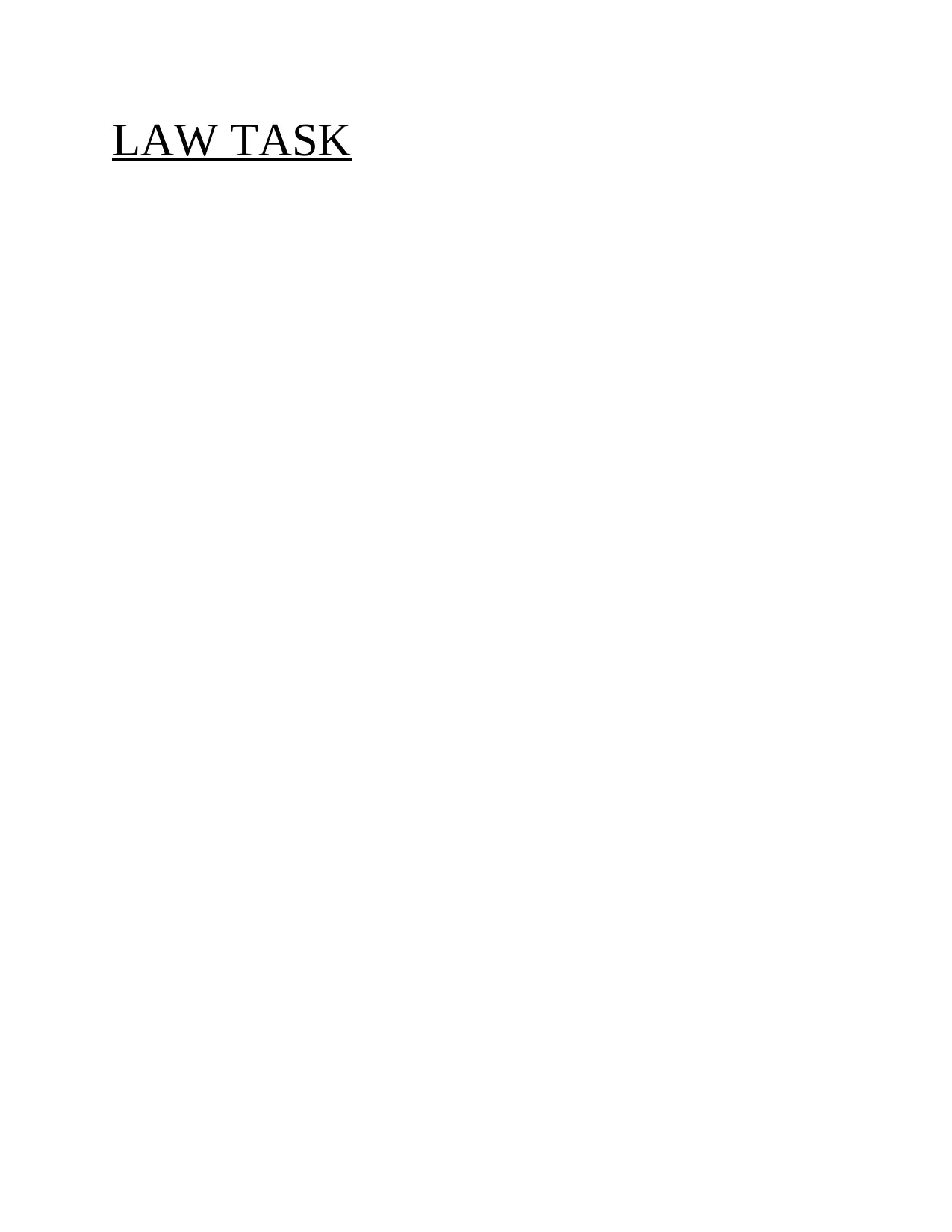
LAW TASK
Paraphrase This Document
Need a fresh take? Get an instant paraphrase of this document with our AI Paraphraser
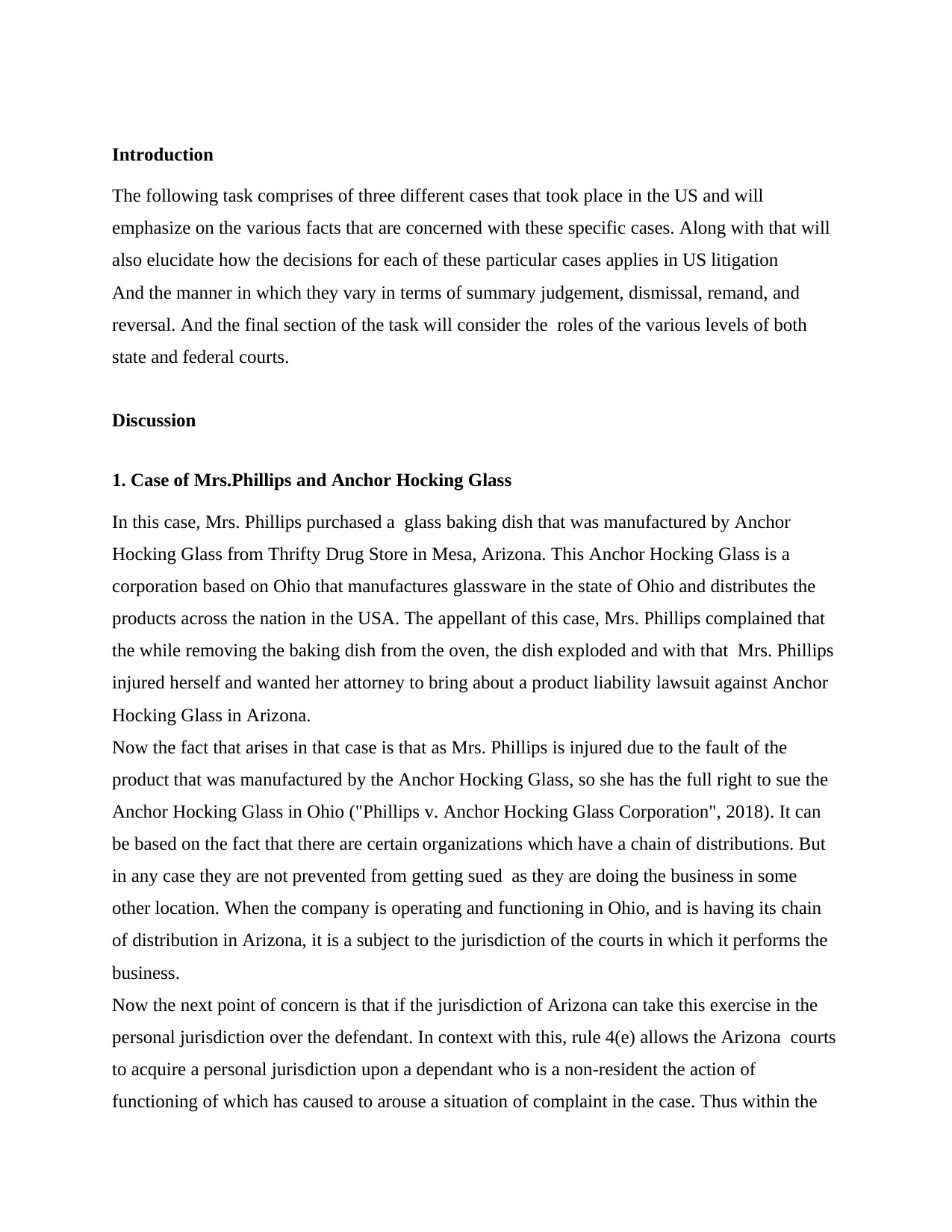
Introduction
The following task comprises of three different cases that took place in the US and will
emphasize on the various facts that are concerned with these specific cases. Along with that will
also elucidate how the decisions for each of these particular cases applies in US litigation
And the manner in which they vary in terms of summary judgement, dismissal, remand, and
reversal. And the final section of the task will consider the roles of the various levels of both
state and federal courts.
Discussion
1. Case of Mrs.Phillips and Anchor Hocking Glass
In this case, Mrs. Phillips purchased a glass baking dish that was manufactured by Anchor
Hocking Glass from Thrifty Drug Store in Mesa, Arizona. This Anchor Hocking Glass is a
corporation based on Ohio that manufactures glassware in the state of Ohio and distributes the
products across the nation in the USA. The appellant of this case, Mrs. Phillips complained that
the while removing the baking dish from the oven, the dish exploded and with that Mrs. Phillips
injured herself and wanted her attorney to bring about a product liability lawsuit against Anchor
Hocking Glass in Arizona.
Now the fact that arises in that case is that as Mrs. Phillips is injured due to the fault of the
product that was manufactured by the Anchor Hocking Glass, so she has the full right to sue the
Anchor Hocking Glass in Ohio ("Phillips v. Anchor Hocking Glass Corporation", 2018). It can
be based on the fact that there are certain organizations which have a chain of distributions. But
in any case they are not prevented from getting sued as they are doing the business in some
other location. When the company is operating and functioning in Ohio, and is having its chain
of distribution in Arizona, it is a subject to the jurisdiction of the courts in which it performs the
business.
Now the next point of concern is that if the jurisdiction of Arizona can take this exercise in the
personal jurisdiction over the defendant. In context with this, rule 4(e) allows the Arizona courts
to acquire a personal jurisdiction upon a dependant who is a non-resident the action of
functioning of which has caused to arouse a situation of complaint in the case. Thus within the
The following task comprises of three different cases that took place in the US and will
emphasize on the various facts that are concerned with these specific cases. Along with that will
also elucidate how the decisions for each of these particular cases applies in US litigation
And the manner in which they vary in terms of summary judgement, dismissal, remand, and
reversal. And the final section of the task will consider the roles of the various levels of both
state and federal courts.
Discussion
1. Case of Mrs.Phillips and Anchor Hocking Glass
In this case, Mrs. Phillips purchased a glass baking dish that was manufactured by Anchor
Hocking Glass from Thrifty Drug Store in Mesa, Arizona. This Anchor Hocking Glass is a
corporation based on Ohio that manufactures glassware in the state of Ohio and distributes the
products across the nation in the USA. The appellant of this case, Mrs. Phillips complained that
the while removing the baking dish from the oven, the dish exploded and with that Mrs. Phillips
injured herself and wanted her attorney to bring about a product liability lawsuit against Anchor
Hocking Glass in Arizona.
Now the fact that arises in that case is that as Mrs. Phillips is injured due to the fault of the
product that was manufactured by the Anchor Hocking Glass, so she has the full right to sue the
Anchor Hocking Glass in Ohio ("Phillips v. Anchor Hocking Glass Corporation", 2018). It can
be based on the fact that there are certain organizations which have a chain of distributions. But
in any case they are not prevented from getting sued as they are doing the business in some
other location. When the company is operating and functioning in Ohio, and is having its chain
of distribution in Arizona, it is a subject to the jurisdiction of the courts in which it performs the
business.
Now the next point of concern is that if the jurisdiction of Arizona can take this exercise in the
personal jurisdiction over the defendant. In context with this, rule 4(e) allows the Arizona courts
to acquire a personal jurisdiction upon a dependant who is a non-resident the action of
functioning of which has caused to arouse a situation of complaint in the case. Thus within the
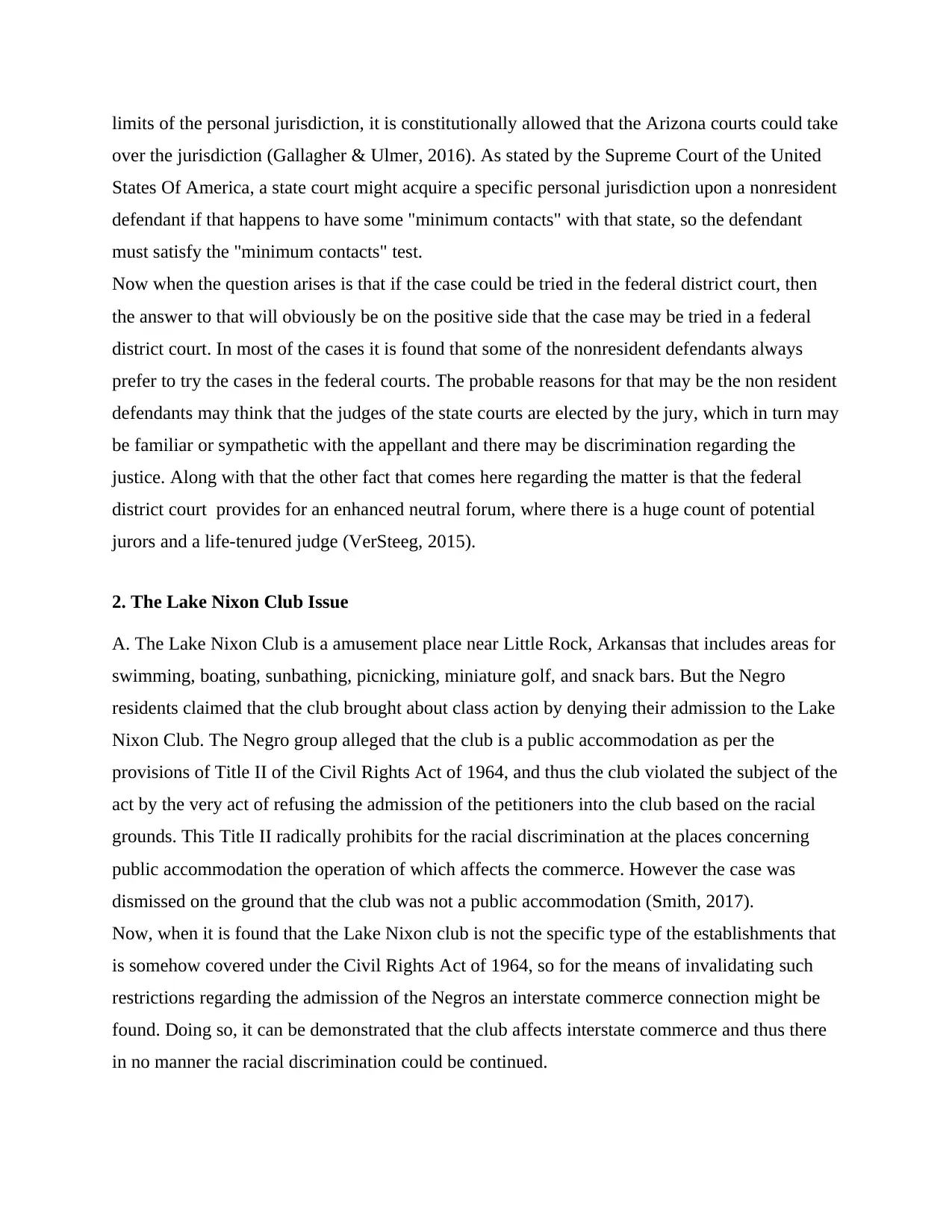
limits of the personal jurisdiction, it is constitutionally allowed that the Arizona courts could take
over the jurisdiction (Gallagher & Ulmer, 2016). As stated by the Supreme Court of the United
States Of America, a state court might acquire a specific personal jurisdiction upon a nonresident
defendant if that happens to have some "minimum contacts" with that state, so the defendant
must satisfy the "minimum contacts" test.
Now when the question arises is that if the case could be tried in the federal district court, then
the answer to that will obviously be on the positive side that the case may be tried in a federal
district court. In most of the cases it is found that some of the nonresident defendants always
prefer to try the cases in the federal courts. The probable reasons for that may be the non resident
defendants may think that the judges of the state courts are elected by the jury, which in turn may
be familiar or sympathetic with the appellant and there may be discrimination regarding the
justice. Along with that the other fact that comes here regarding the matter is that the federal
district court provides for an enhanced neutral forum, where there is a huge count of potential
jurors and a life-tenured judge (VerSteeg, 2015).
2. The Lake Nixon Club Issue
A. The Lake Nixon Club is a amusement place near Little Rock, Arkansas that includes areas for
swimming, boating, sunbathing, picnicking, miniature golf, and snack bars. But the Negro
residents claimed that the club brought about class action by denying their admission to the Lake
Nixon Club. The Negro group alleged that the club is a public accommodation as per the
provisions of Title II of the Civil Rights Act of 1964, and thus the club violated the subject of the
act by the very act of refusing the admission of the petitioners into the club based on the racial
grounds. This Title II radically prohibits for the racial discrimination at the places concerning
public accommodation the operation of which affects the commerce. However the case was
dismissed on the ground that the club was not a public accommodation (Smith, 2017).
Now, when it is found that the Lake Nixon club is not the specific type of the establishments that
is somehow covered under the Civil Rights Act of 1964, so for the means of invalidating such
restrictions regarding the admission of the Negros an interstate commerce connection might be
found. Doing so, it can be demonstrated that the club affects interstate commerce and thus there
in no manner the racial discrimination could be continued.
over the jurisdiction (Gallagher & Ulmer, 2016). As stated by the Supreme Court of the United
States Of America, a state court might acquire a specific personal jurisdiction upon a nonresident
defendant if that happens to have some "minimum contacts" with that state, so the defendant
must satisfy the "minimum contacts" test.
Now when the question arises is that if the case could be tried in the federal district court, then
the answer to that will obviously be on the positive side that the case may be tried in a federal
district court. In most of the cases it is found that some of the nonresident defendants always
prefer to try the cases in the federal courts. The probable reasons for that may be the non resident
defendants may think that the judges of the state courts are elected by the jury, which in turn may
be familiar or sympathetic with the appellant and there may be discrimination regarding the
justice. Along with that the other fact that comes here regarding the matter is that the federal
district court provides for an enhanced neutral forum, where there is a huge count of potential
jurors and a life-tenured judge (VerSteeg, 2015).
2. The Lake Nixon Club Issue
A. The Lake Nixon Club is a amusement place near Little Rock, Arkansas that includes areas for
swimming, boating, sunbathing, picnicking, miniature golf, and snack bars. But the Negro
residents claimed that the club brought about class action by denying their admission to the Lake
Nixon Club. The Negro group alleged that the club is a public accommodation as per the
provisions of Title II of the Civil Rights Act of 1964, and thus the club violated the subject of the
act by the very act of refusing the admission of the petitioners into the club based on the racial
grounds. This Title II radically prohibits for the racial discrimination at the places concerning
public accommodation the operation of which affects the commerce. However the case was
dismissed on the ground that the club was not a public accommodation (Smith, 2017).
Now, when it is found that the Lake Nixon club is not the specific type of the establishments that
is somehow covered under the Civil Rights Act of 1964, so for the means of invalidating such
restrictions regarding the admission of the Negros an interstate commerce connection might be
found. Doing so, it can be demonstrated that the club affects interstate commerce and thus there
in no manner the racial discrimination could be continued.
⊘ This is a preview!⊘
Do you want full access?
Subscribe today to unlock all pages.

Trusted by 1+ million students worldwide
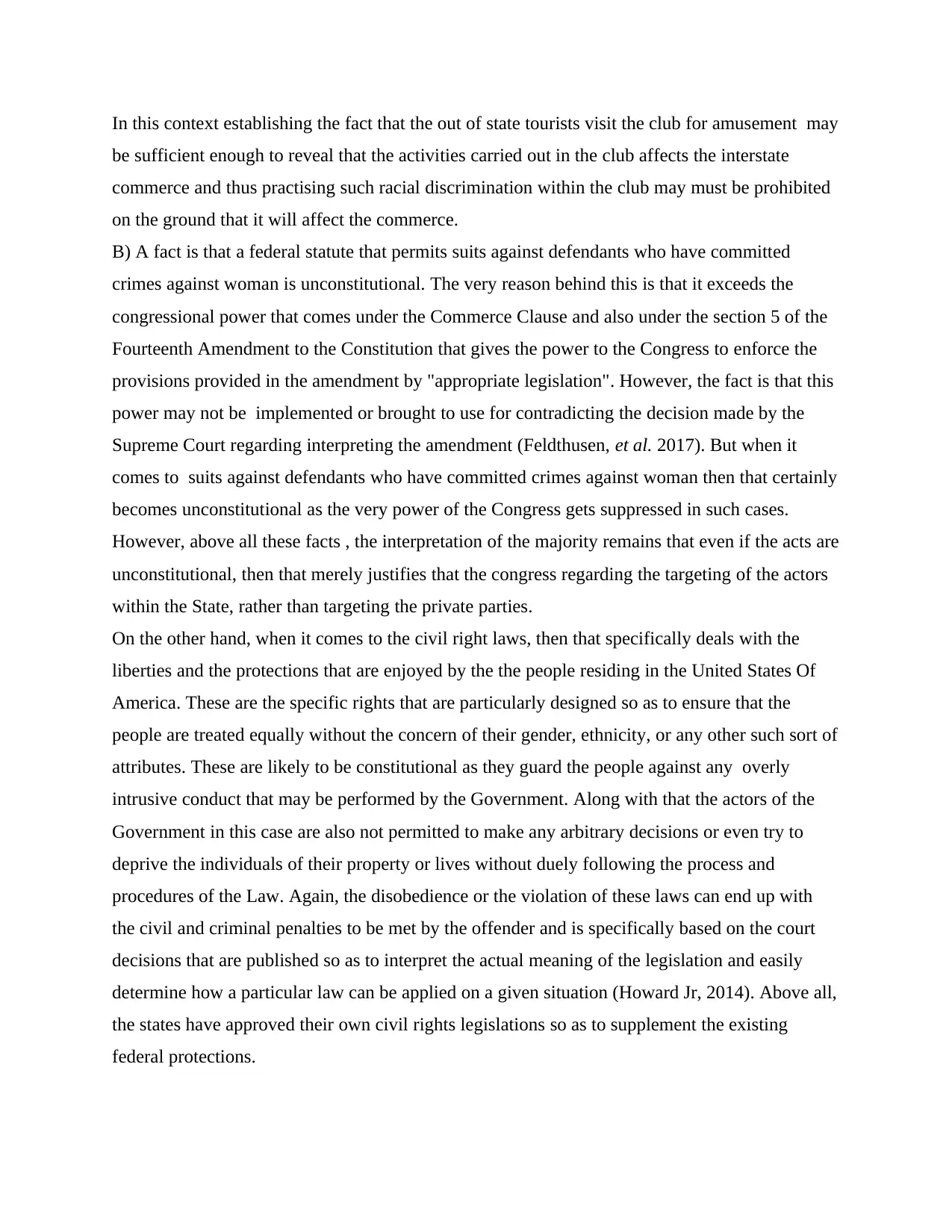
In this context establishing the fact that the out of state tourists visit the club for amusement may
be sufficient enough to reveal that the activities carried out in the club affects the interstate
commerce and thus practising such racial discrimination within the club may must be prohibited
on the ground that it will affect the commerce.
B) A fact is that a federal statute that permits suits against defendants who have committed
crimes against woman is unconstitutional. The very reason behind this is that it exceeds the
congressional power that comes under the Commerce Clause and also under the section 5 of the
Fourteenth Amendment to the Constitution that gives the power to the Congress to enforce the
provisions provided in the amendment by "appropriate legislation". However, the fact is that this
power may not be implemented or brought to use for contradicting the decision made by the
Supreme Court regarding interpreting the amendment (Feldthusen, et al. 2017). But when it
comes to suits against defendants who have committed crimes against woman then that certainly
becomes unconstitutional as the very power of the Congress gets suppressed in such cases.
However, above all these facts , the interpretation of the majority remains that even if the acts are
unconstitutional, then that merely justifies that the congress regarding the targeting of the actors
within the State, rather than targeting the private parties.
On the other hand, when it comes to the civil right laws, then that specifically deals with the
liberties and the protections that are enjoyed by the the people residing in the United States Of
America. These are the specific rights that are particularly designed so as to ensure that the
people are treated equally without the concern of their gender, ethnicity, or any other such sort of
attributes. These are likely to be constitutional as they guard the people against any overly
intrusive conduct that may be performed by the Government. Along with that the actors of the
Government in this case are also not permitted to make any arbitrary decisions or even try to
deprive the individuals of their property or lives without duely following the process and
procedures of the Law. Again, the disobedience or the violation of these laws can end up with
the civil and criminal penalties to be met by the offender and is specifically based on the court
decisions that are published so as to interpret the actual meaning of the legislation and easily
determine how a particular law can be applied on a given situation (Howard Jr, 2014). Above all,
the states have approved their own civil rights legislations so as to supplement the existing
federal protections.
be sufficient enough to reveal that the activities carried out in the club affects the interstate
commerce and thus practising such racial discrimination within the club may must be prohibited
on the ground that it will affect the commerce.
B) A fact is that a federal statute that permits suits against defendants who have committed
crimes against woman is unconstitutional. The very reason behind this is that it exceeds the
congressional power that comes under the Commerce Clause and also under the section 5 of the
Fourteenth Amendment to the Constitution that gives the power to the Congress to enforce the
provisions provided in the amendment by "appropriate legislation". However, the fact is that this
power may not be implemented or brought to use for contradicting the decision made by the
Supreme Court regarding interpreting the amendment (Feldthusen, et al. 2017). But when it
comes to suits against defendants who have committed crimes against woman then that certainly
becomes unconstitutional as the very power of the Congress gets suppressed in such cases.
However, above all these facts , the interpretation of the majority remains that even if the acts are
unconstitutional, then that merely justifies that the congress regarding the targeting of the actors
within the State, rather than targeting the private parties.
On the other hand, when it comes to the civil right laws, then that specifically deals with the
liberties and the protections that are enjoyed by the the people residing in the United States Of
America. These are the specific rights that are particularly designed so as to ensure that the
people are treated equally without the concern of their gender, ethnicity, or any other such sort of
attributes. These are likely to be constitutional as they guard the people against any overly
intrusive conduct that may be performed by the Government. Along with that the actors of the
Government in this case are also not permitted to make any arbitrary decisions or even try to
deprive the individuals of their property or lives without duely following the process and
procedures of the Law. Again, the disobedience or the violation of these laws can end up with
the civil and criminal penalties to be met by the offender and is specifically based on the court
decisions that are published so as to interpret the actual meaning of the legislation and easily
determine how a particular law can be applied on a given situation (Howard Jr, 2014). Above all,
the states have approved their own civil rights legislations so as to supplement the existing
federal protections.
Paraphrase This Document
Need a fresh take? Get an instant paraphrase of this document with our AI Paraphraser
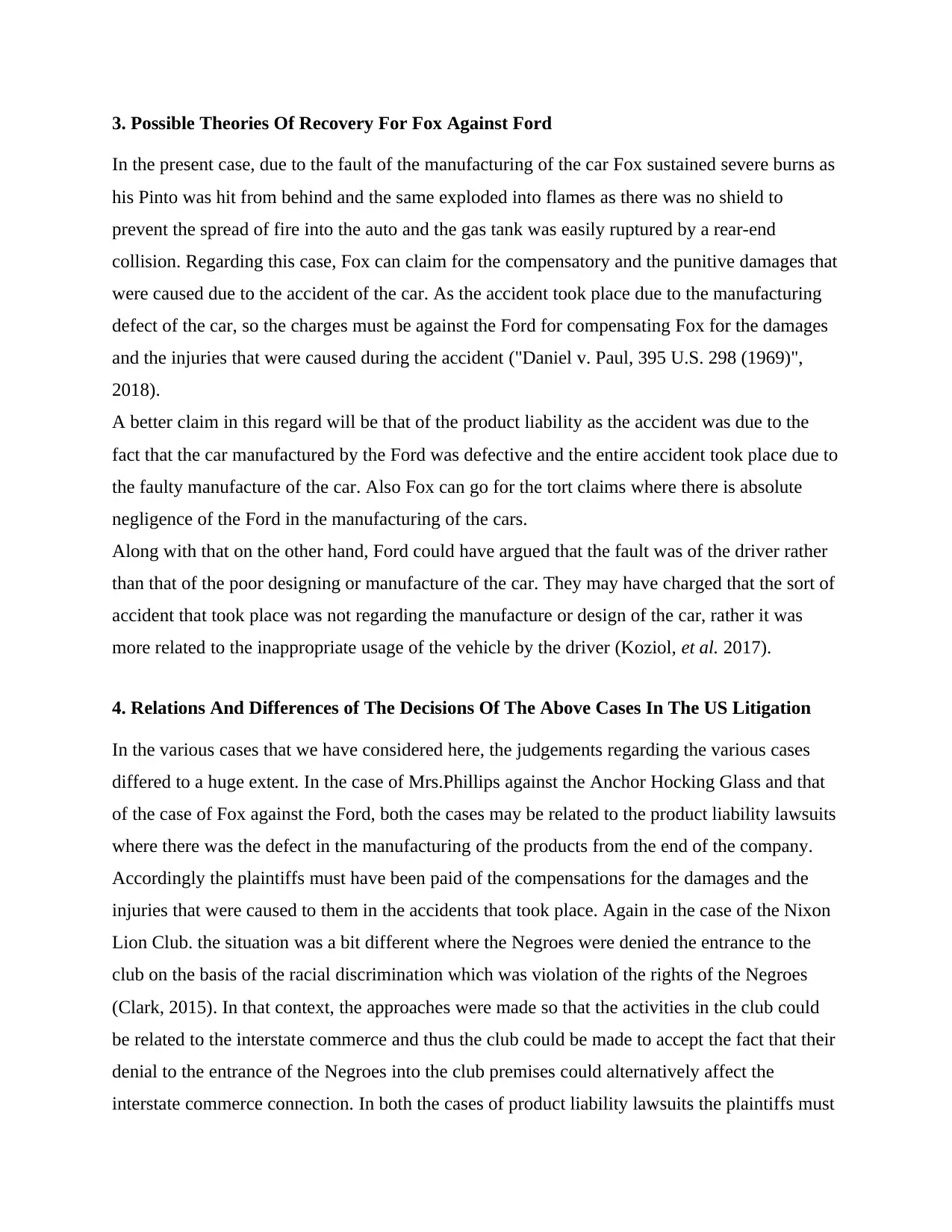
3. Possible Theories Of Recovery For Fox Against Ford
In the present case, due to the fault of the manufacturing of the car Fox sustained severe burns as
his Pinto was hit from behind and the same exploded into flames as there was no shield to
prevent the spread of fire into the auto and the gas tank was easily ruptured by a rear-end
collision. Regarding this case, Fox can claim for the compensatory and the punitive damages that
were caused due to the accident of the car. As the accident took place due to the manufacturing
defect of the car, so the charges must be against the Ford for compensating Fox for the damages
and the injuries that were caused during the accident ("Daniel v. Paul, 395 U.S. 298 (1969)",
2018).
A better claim in this regard will be that of the product liability as the accident was due to the
fact that the car manufactured by the Ford was defective and the entire accident took place due to
the faulty manufacture of the car. Also Fox can go for the tort claims where there is absolute
negligence of the Ford in the manufacturing of the cars.
Along with that on the other hand, Ford could have argued that the fault was of the driver rather
than that of the poor designing or manufacture of the car. They may have charged that the sort of
accident that took place was not regarding the manufacture or design of the car, rather it was
more related to the inappropriate usage of the vehicle by the driver (Koziol, et al. 2017).
4. Relations And Differences of The Decisions Of The Above Cases In The US Litigation
In the various cases that we have considered here, the judgements regarding the various cases
differed to a huge extent. In the case of Mrs.Phillips against the Anchor Hocking Glass and that
of the case of Fox against the Ford, both the cases may be related to the product liability lawsuits
where there was the defect in the manufacturing of the products from the end of the company.
Accordingly the plaintiffs must have been paid of the compensations for the damages and the
injuries that were caused to them in the accidents that took place. Again in the case of the Nixon
Lion Club. the situation was a bit different where the Negroes were denied the entrance to the
club on the basis of the racial discrimination which was violation of the rights of the Negroes
(Clark, 2015). In that context, the approaches were made so that the activities in the club could
be related to the interstate commerce and thus the club could be made to accept the fact that their
denial to the entrance of the Negroes into the club premises could alternatively affect the
interstate commerce connection. In both the cases of product liability lawsuits the plaintiffs must
In the present case, due to the fault of the manufacturing of the car Fox sustained severe burns as
his Pinto was hit from behind and the same exploded into flames as there was no shield to
prevent the spread of fire into the auto and the gas tank was easily ruptured by a rear-end
collision. Regarding this case, Fox can claim for the compensatory and the punitive damages that
were caused due to the accident of the car. As the accident took place due to the manufacturing
defect of the car, so the charges must be against the Ford for compensating Fox for the damages
and the injuries that were caused during the accident ("Daniel v. Paul, 395 U.S. 298 (1969)",
2018).
A better claim in this regard will be that of the product liability as the accident was due to the
fact that the car manufactured by the Ford was defective and the entire accident took place due to
the faulty manufacture of the car. Also Fox can go for the tort claims where there is absolute
negligence of the Ford in the manufacturing of the cars.
Along with that on the other hand, Ford could have argued that the fault was of the driver rather
than that of the poor designing or manufacture of the car. They may have charged that the sort of
accident that took place was not regarding the manufacture or design of the car, rather it was
more related to the inappropriate usage of the vehicle by the driver (Koziol, et al. 2017).
4. Relations And Differences of The Decisions Of The Above Cases In The US Litigation
In the various cases that we have considered here, the judgements regarding the various cases
differed to a huge extent. In the case of Mrs.Phillips against the Anchor Hocking Glass and that
of the case of Fox against the Ford, both the cases may be related to the product liability lawsuits
where there was the defect in the manufacturing of the products from the end of the company.
Accordingly the plaintiffs must have been paid of the compensations for the damages and the
injuries that were caused to them in the accidents that took place. Again in the case of the Nixon
Lion Club. the situation was a bit different where the Negroes were denied the entrance to the
club on the basis of the racial discrimination which was violation of the rights of the Negroes
(Clark, 2015). In that context, the approaches were made so that the activities in the club could
be related to the interstate commerce and thus the club could be made to accept the fact that their
denial to the entrance of the Negroes into the club premises could alternatively affect the
interstate commerce connection. In both the cases of product liability lawsuits the plaintiffs must
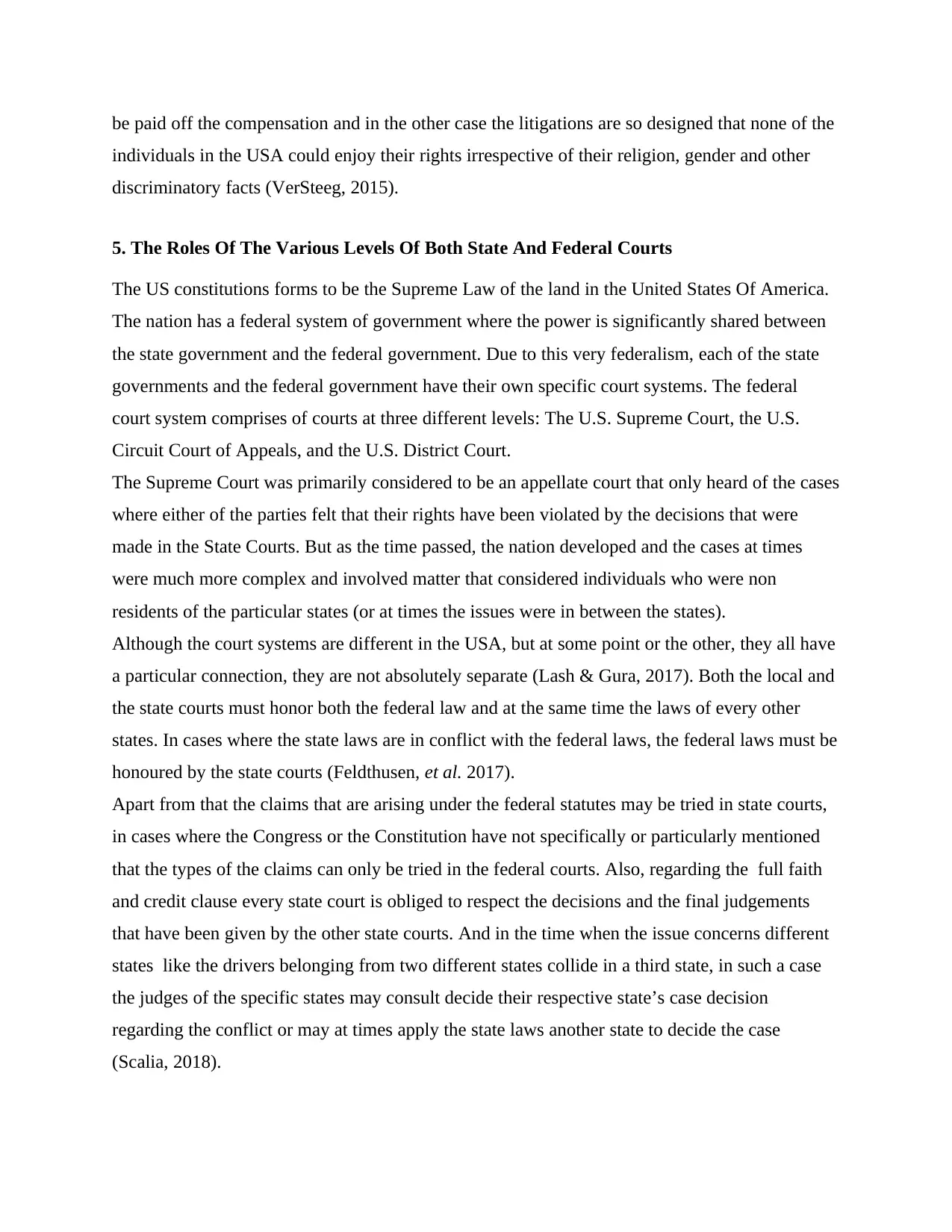
be paid off the compensation and in the other case the litigations are so designed that none of the
individuals in the USA could enjoy their rights irrespective of their religion, gender and other
discriminatory facts (VerSteeg, 2015).
5. The Roles Of The Various Levels Of Both State And Federal Courts
The US constitutions forms to be the Supreme Law of the land in the United States Of America.
The nation has a federal system of government where the power is significantly shared between
the state government and the federal government. Due to this very federalism, each of the state
governments and the federal government have their own specific court systems. The federal
court system comprises of courts at three different levels: The U.S. Supreme Court, the U.S.
Circuit Court of Appeals, and the U.S. District Court.
The Supreme Court was primarily considered to be an appellate court that only heard of the cases
where either of the parties felt that their rights have been violated by the decisions that were
made in the State Courts. But as the time passed, the nation developed and the cases at times
were much more complex and involved matter that considered individuals who were non
residents of the particular states (or at times the issues were in between the states).
Although the court systems are different in the USA, but at some point or the other, they all have
a particular connection, they are not absolutely separate (Lash & Gura, 2017). Both the local and
the state courts must honor both the federal law and at the same time the laws of every other
states. In cases where the state laws are in conflict with the federal laws, the federal laws must be
honoured by the state courts (Feldthusen, et al. 2017).
Apart from that the claims that are arising under the federal statutes may be tried in state courts,
in cases where the Congress or the Constitution have not specifically or particularly mentioned
that the types of the claims can only be tried in the federal courts. Also, regarding the full faith
and credit clause every state court is obliged to respect the decisions and the final judgements
that have been given by the other state courts. And in the time when the issue concerns different
states like the drivers belonging from two different states collide in a third state, in such a case
the judges of the specific states may consult decide their respective state’s case decision
regarding the conflict or may at times apply the state laws another state to decide the case
(Scalia, 2018).
individuals in the USA could enjoy their rights irrespective of their religion, gender and other
discriminatory facts (VerSteeg, 2015).
5. The Roles Of The Various Levels Of Both State And Federal Courts
The US constitutions forms to be the Supreme Law of the land in the United States Of America.
The nation has a federal system of government where the power is significantly shared between
the state government and the federal government. Due to this very federalism, each of the state
governments and the federal government have their own specific court systems. The federal
court system comprises of courts at three different levels: The U.S. Supreme Court, the U.S.
Circuit Court of Appeals, and the U.S. District Court.
The Supreme Court was primarily considered to be an appellate court that only heard of the cases
where either of the parties felt that their rights have been violated by the decisions that were
made in the State Courts. But as the time passed, the nation developed and the cases at times
were much more complex and involved matter that considered individuals who were non
residents of the particular states (or at times the issues were in between the states).
Although the court systems are different in the USA, but at some point or the other, they all have
a particular connection, they are not absolutely separate (Lash & Gura, 2017). Both the local and
the state courts must honor both the federal law and at the same time the laws of every other
states. In cases where the state laws are in conflict with the federal laws, the federal laws must be
honoured by the state courts (Feldthusen, et al. 2017).
Apart from that the claims that are arising under the federal statutes may be tried in state courts,
in cases where the Congress or the Constitution have not specifically or particularly mentioned
that the types of the claims can only be tried in the federal courts. Also, regarding the full faith
and credit clause every state court is obliged to respect the decisions and the final judgements
that have been given by the other state courts. And in the time when the issue concerns different
states like the drivers belonging from two different states collide in a third state, in such a case
the judges of the specific states may consult decide their respective state’s case decision
regarding the conflict or may at times apply the state laws another state to decide the case
(Scalia, 2018).
⊘ This is a preview!⊘
Do you want full access?
Subscribe today to unlock all pages.

Trusted by 1+ million students worldwide
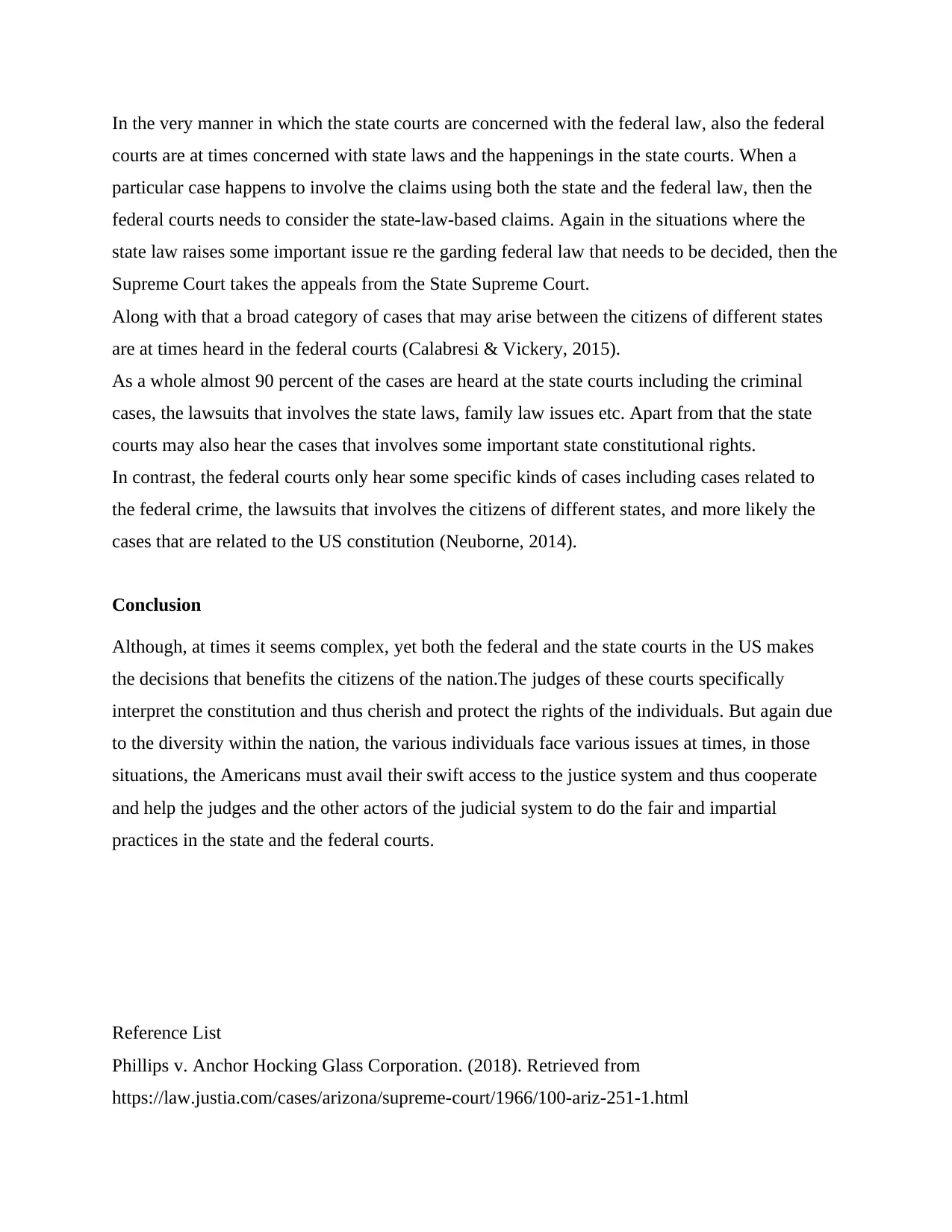
In the very manner in which the state courts are concerned with the federal law, also the federal
courts are at times concerned with state laws and the happenings in the state courts. When a
particular case happens to involve the claims using both the state and the federal law, then the
federal courts needs to consider the state-law-based claims. Again in the situations where the
state law raises some important issue re the garding federal law that needs to be decided, then the
Supreme Court takes the appeals from the State Supreme Court.
Along with that a broad category of cases that may arise between the citizens of different states
are at times heard in the federal courts (Calabresi & Vickery, 2015).
As a whole almost 90 percent of the cases are heard at the state courts including the criminal
cases, the lawsuits that involves the state laws, family law issues etc. Apart from that the state
courts may also hear the cases that involves some important state constitutional rights.
In contrast, the federal courts only hear some specific kinds of cases including cases related to
the federal crime, the lawsuits that involves the citizens of different states, and more likely the
cases that are related to the US constitution (Neuborne, 2014).
Conclusion
Although, at times it seems complex, yet both the federal and the state courts in the US makes
the decisions that benefits the citizens of the nation.The judges of these courts specifically
interpret the constitution and thus cherish and protect the rights of the individuals. But again due
to the diversity within the nation, the various individuals face various issues at times, in those
situations, the Americans must avail their swift access to the justice system and thus cooperate
and help the judges and the other actors of the judicial system to do the fair and impartial
practices in the state and the federal courts.
Reference List
Phillips v. Anchor Hocking Glass Corporation. (2018). Retrieved from
https://law.justia.com/cases/arizona/supreme-court/1966/100-ariz-251-1.html
courts are at times concerned with state laws and the happenings in the state courts. When a
particular case happens to involve the claims using both the state and the federal law, then the
federal courts needs to consider the state-law-based claims. Again in the situations where the
state law raises some important issue re the garding federal law that needs to be decided, then the
Supreme Court takes the appeals from the State Supreme Court.
Along with that a broad category of cases that may arise between the citizens of different states
are at times heard in the federal courts (Calabresi & Vickery, 2015).
As a whole almost 90 percent of the cases are heard at the state courts including the criminal
cases, the lawsuits that involves the state laws, family law issues etc. Apart from that the state
courts may also hear the cases that involves some important state constitutional rights.
In contrast, the federal courts only hear some specific kinds of cases including cases related to
the federal crime, the lawsuits that involves the citizens of different states, and more likely the
cases that are related to the US constitution (Neuborne, 2014).
Conclusion
Although, at times it seems complex, yet both the federal and the state courts in the US makes
the decisions that benefits the citizens of the nation.The judges of these courts specifically
interpret the constitution and thus cherish and protect the rights of the individuals. But again due
to the diversity within the nation, the various individuals face various issues at times, in those
situations, the Americans must avail their swift access to the justice system and thus cooperate
and help the judges and the other actors of the judicial system to do the fair and impartial
practices in the state and the federal courts.
Reference List
Phillips v. Anchor Hocking Glass Corporation. (2018). Retrieved from
https://law.justia.com/cases/arizona/supreme-court/1966/100-ariz-251-1.html
Paraphrase This Document
Need a fresh take? Get an instant paraphrase of this document with our AI Paraphraser
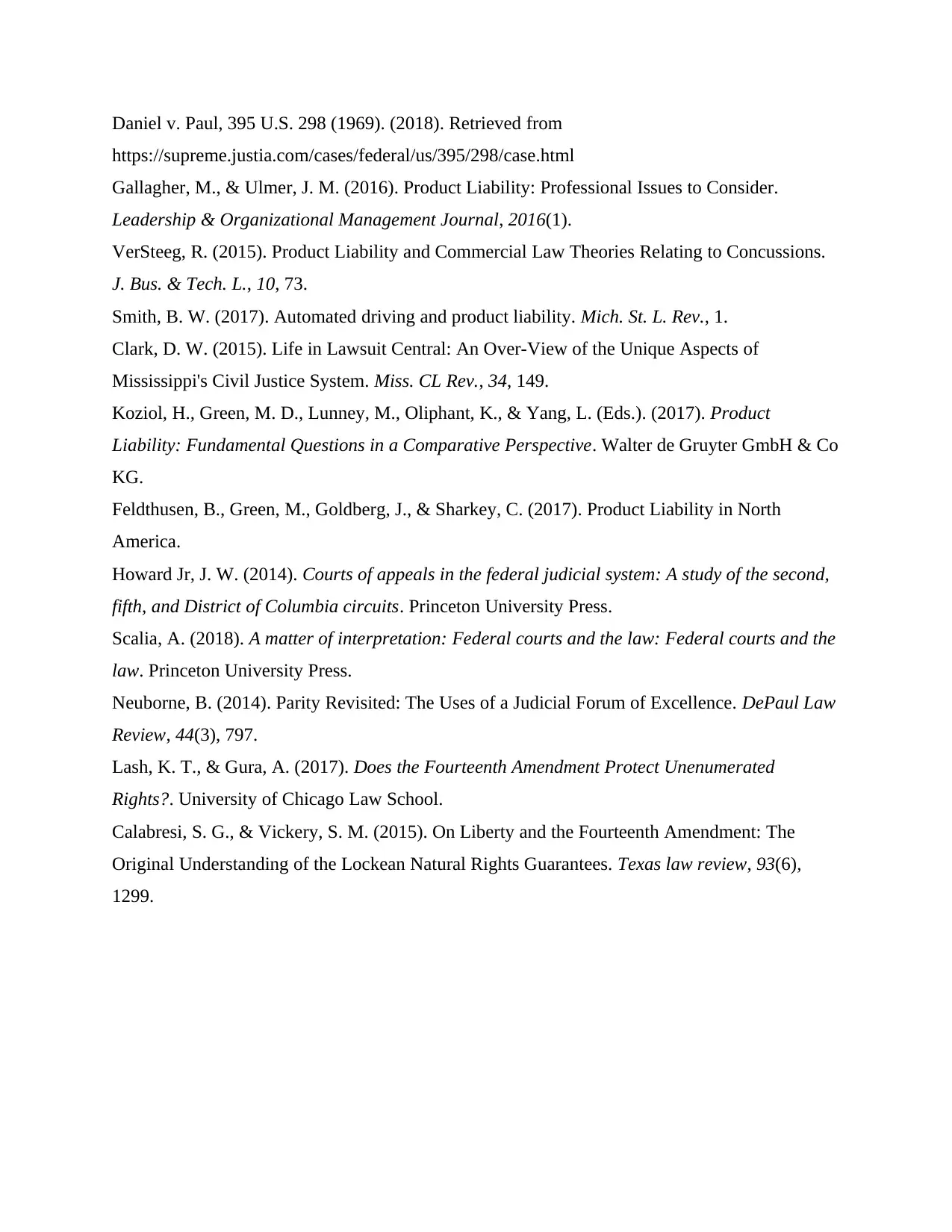
Daniel v. Paul, 395 U.S. 298 (1969). (2018). Retrieved from
https://supreme.justia.com/cases/federal/us/395/298/case.html
Gallagher, M., & Ulmer, J. M. (2016). Product Liability: Professional Issues to Consider.
Leadership & Organizational Management Journal, 2016(1).
VerSteeg, R. (2015). Product Liability and Commercial Law Theories Relating to Concussions.
J. Bus. & Tech. L., 10, 73.
Smith, B. W. (2017). Automated driving and product liability. Mich. St. L. Rev., 1.
Clark, D. W. (2015). Life in Lawsuit Central: An Over-View of the Unique Aspects of
Mississippi's Civil Justice System. Miss. CL Rev., 34, 149.
Koziol, H., Green, M. D., Lunney, M., Oliphant, K., & Yang, L. (Eds.). (2017). Product
Liability: Fundamental Questions in a Comparative Perspective. Walter de Gruyter GmbH & Co
KG.
Feldthusen, B., Green, M., Goldberg, J., & Sharkey, C. (2017). Product Liability in North
America.
Howard Jr, J. W. (2014). Courts of appeals in the federal judicial system: A study of the second,
fifth, and District of Columbia circuits. Princeton University Press.
Scalia, A. (2018). A matter of interpretation: Federal courts and the law: Federal courts and the
law. Princeton University Press.
Neuborne, B. (2014). Parity Revisited: The Uses of a Judicial Forum of Excellence. DePaul Law
Review, 44(3), 797.
Lash, K. T., & Gura, A. (2017). Does the Fourteenth Amendment Protect Unenumerated
Rights?. University of Chicago Law School.
Calabresi, S. G., & Vickery, S. M. (2015). On Liberty and the Fourteenth Amendment: The
Original Understanding of the Lockean Natural Rights Guarantees. Texas law review, 93(6),
1299.
https://supreme.justia.com/cases/federal/us/395/298/case.html
Gallagher, M., & Ulmer, J. M. (2016). Product Liability: Professional Issues to Consider.
Leadership & Organizational Management Journal, 2016(1).
VerSteeg, R. (2015). Product Liability and Commercial Law Theories Relating to Concussions.
J. Bus. & Tech. L., 10, 73.
Smith, B. W. (2017). Automated driving and product liability. Mich. St. L. Rev., 1.
Clark, D. W. (2015). Life in Lawsuit Central: An Over-View of the Unique Aspects of
Mississippi's Civil Justice System. Miss. CL Rev., 34, 149.
Koziol, H., Green, M. D., Lunney, M., Oliphant, K., & Yang, L. (Eds.). (2017). Product
Liability: Fundamental Questions in a Comparative Perspective. Walter de Gruyter GmbH & Co
KG.
Feldthusen, B., Green, M., Goldberg, J., & Sharkey, C. (2017). Product Liability in North
America.
Howard Jr, J. W. (2014). Courts of appeals in the federal judicial system: A study of the second,
fifth, and District of Columbia circuits. Princeton University Press.
Scalia, A. (2018). A matter of interpretation: Federal courts and the law: Federal courts and the
law. Princeton University Press.
Neuborne, B. (2014). Parity Revisited: The Uses of a Judicial Forum of Excellence. DePaul Law
Review, 44(3), 797.
Lash, K. T., & Gura, A. (2017). Does the Fourteenth Amendment Protect Unenumerated
Rights?. University of Chicago Law School.
Calabresi, S. G., & Vickery, S. M. (2015). On Liberty and the Fourteenth Amendment: The
Original Understanding of the Lockean Natural Rights Guarantees. Texas law review, 93(6),
1299.
1 out of 8
Your All-in-One AI-Powered Toolkit for Academic Success.
+13062052269
info@desklib.com
Available 24*7 on WhatsApp / Email
![[object Object]](/_next/static/media/star-bottom.7253800d.svg)
Unlock your academic potential
Copyright © 2020–2026 A2Z Services. All Rights Reserved. Developed and managed by ZUCOL.